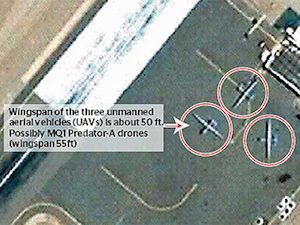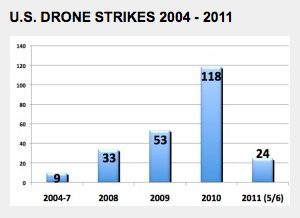Unsurprising Secret Deal has Become a Raw Deal

Caught on camera: Drones spotted in a satellite picture in 2006. The picture was once available via Google Earth. Source: longwarjournal.org
So it seems Pakistan and the US had a “secret deal” allowing the US to launch unilateral missions in Pakistani territory.
Is this surprising?
No.
For years now, many people in Pakistan had already believed this to be fact. And while the 237 drone attacks that have occurred since 2004 until today do not prove the existence of a deal that permits unilateral action by Uncle Sam, they sure do suggest some understanding between the two countries. Sure, the Pakistani government complains publicly about the CIA-operated Predator drones, but there is widespread belief that the Pakistani government and military had signed off on the remote-controlled air strikes years ago. Diplomatic cables made public by Wikileaks in late 2010 also showed drone strikes had the approval of Prime Minister Gilani. Moreover, it is also widely accepted that the US was launching drone strikes from Shamsi airfield in Balochistan. Images from Google Earth, captured in 2006 and published in later years by The News International and confirmed by London’s The Times, seem to show three Predator drones outside a hangar at Shamsi (see photo above).
In early 2009, The Times reported, “US special forces used the airbase during the invasion of Afghanistan in 2001, but the Pakistani Government said in 2006 that the Americans had left.” In August 2009, the blog Asian Defence reported that the CIA “has secretly added a second site at an airbase in Jalalabad, Afghanistan.” Just last month there were reports that Pakistan had kicked the US out from Shamsi Airbase, but a US official denied it.
Here is what the Guardian reported on May 9, 2011, about the “secret deal” giving the US the authority to operate covert missions in Pakistan:
The deal was struck between the military leader General Pervez Musharraf and President George Bush after Bin Laden escaped US forces in the mountains of Tora Bora in late 2001, according to serving and retired Pakistani and US officials.
Under its terms, Pakistan would allow US forces to conduct a unilateral raid inside Pakistan in search of Bin Laden, his deputy, Ayman al-Zawahiri, and the Al-Qaeda No 3. Afterwards, both sides agreed, Pakistan would vociferously protest the incursion.
“There was an agreement between Bush and Musharraf that if we knew where Osama was, we were going to come and get him,” said a former senior US official with knowledge of counter-terrorism operations. “The Pakistanis would put up a hue and cry, but they wouldn’t stop us.”
Sound familiar? It’s been happening for years. First Pakistan cried about the violations of sovereignty and then it also started reprimanding the US about the “counter-productive” nature of the air strikes. The “hue and cry” was constant. And now, after some initial near silence and muted condemnation following the raid on Osama bin Laden’s compound on May 2, the Foreign Office eventually said this in its second statement in the wake of the death of the Al-Qaeda leader:
The Government of Pakistan expresses its deep concerns and reservations on the manner in which the Government of the United States carried out this operation without prior information or authorization from the Government of Pakistan.
Of course a lot of other voices on the political scene were screaming about honour and sovereignty too. One of those voices was former President and retired General Pervez Musharraf. Obviously, the above revelation from both Pakistani and US sources in the Guardian makes the tough-talking Musharraf look silly, and, well, like a hypocrite. Here’s what Musharraf said after the May 2 raid in an interview with IBN Live:
“American troops coming across the border and taking action in one of our towns, that is Abbottabad, is not acceptable to the people of Pakistan. It is a violation of our sovereignty. It would have been far better if the Pakistani Special Services Group had operated and conducted the mission.”
He finishes the thought by re-iterating that the modality of the mission was not correct. Musharraf shared similar comments to a crowd of supporters in Dubai on May 6 at a function held in his honour in recognition for his efforts in the war against terror. Clearly he has done a lot: by giving the US a “blank cheque” for major covert operations he ensured that tracking down the most wanted terrorists would not be left to the ISI. The entire peace-loving world should recognise Musharraf for that.
* * *

Part of the deal? There have been 237 US drone attacks in Pakistan from 2004 up until May 9, 2011. Source: The New America Foundation
Since the raid against bin Laden, the Pakistani military and the ISI have suffered a PR nightmare. The reputation of the Pakistan army has been battered with allegations of incompetence and duplicity. This latest revelation in the Guardian won’t help, as these secret deals were made by a military man and seemingly upheld by the current Chief of Army Staff.
Of course these revelations shouldn’t, in theory, help the civilian government much either, even though it may now be trying to strengthen its position and wrestle power from the military establishment. The Guardian reports that the secret deal was renewed by Musharraf after the parliamentary elections of 2008. This means the PPP was in power when this authority was re-extended to the US. Then, soon afterwards, PPP co-chairman Zardari took over the helm of the country as a president with full dictatorial powers (before the 18th Amendment was passed). President Zardari was likely aware of this arrangement given that he was, arguably, the most powerful man in the country and soon earned himself the reputation of being an American lapdog. And ever since the Raymond Davis crisis, the PPP regime’s relationship with the US has come under more scrutiny. Shah Mehmood Qureshi resigned over what he said were efforts by the PPP government to grant CIA operative Davis diplomatic status retroactively. And there was much discussion and worry in the press about thousands of Pakistani visas issued to US employees without the usual due diligence and screening. Of course, this all has happened under Zardari and Gilani’s joint watch.
Nonetheless, this newly revealed secret deal will be seen mostly as a military deal. So just as the Pakistani nation looks askance at the army and its men in uniform, more bombshells are dropped on the national institution that was deemed to be the most competent. The army will also now seem less trustworthy than ever before to the common man: the army was supposed to the one true protector of the nation. Another myth bites the dust.
Of course, if US operations have been conducted with tacit approval from Pakistan, perhaps then, Pakistan-US relations are not as bad as they seem: maybe some (and a bit more) of the conflict and friction is for show, and especially for domestic consumption in both countries. But that is wishful thinking. Things have seriously escalated since the US found the most wanted terrorist in the world living on the doorstep of Pakistan’s premier military academy after years of public denials by Pakistani officials about his presence in the country. Moreover, Pakistan’s backroom approvals of US covert military operations don’t explain why the army allows its, and the country’s, name to be dragged through the mud, and have its position in the CIA-ISI relationship weakened. The fact that the US openly questioned Pakistan’s loyalties (turning Pakistan and Pakistanis into pariahs on the world stage) shows that Pakistan’s ‘partner’ is publicly becoming a bully: the US is demanding the names of ISI operatives and has said it will launch more covert attacks like “Operation Geronimo” if necessary. There are several militant groups based in Pakistan that the US deems to be threats. And there is the ever-present concern of Pakistan’s nuclear arsenal.
It is clear that the problems for Pakistan exceed the violated intangible of sovereignty. New targets are being eyed in Pakistan by the US, and the questions and worries exposed by “Operation Geronimo” help confirm their legitimacy as targets. Also, any shift in power the ISI gained from the Davis affair has been quickly expropriated by the CIA. This secret deal between the US and Pakistan has opened up a Pandora’s Box of very real problems for Pakistan. In which case for Pakistan, this secret deal has become a raw deal.



